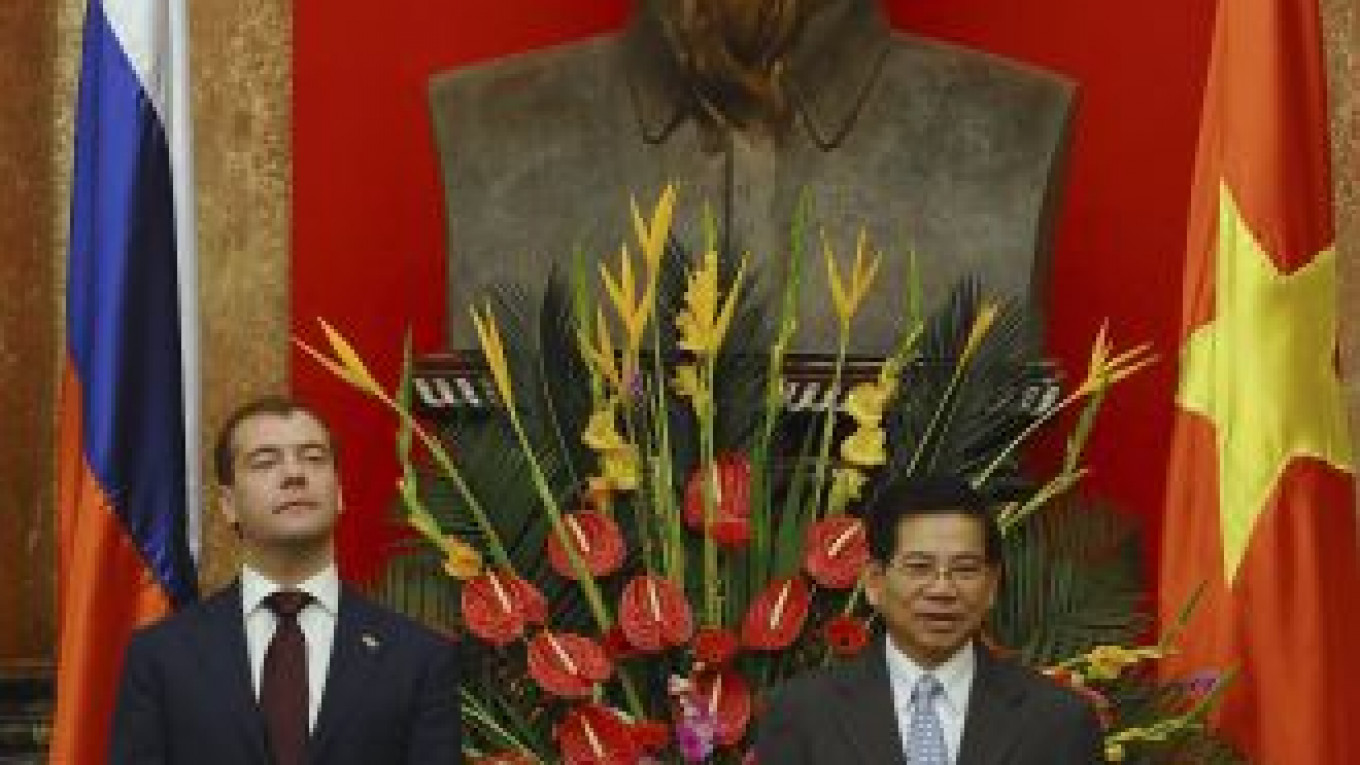Rosatom signed an agreement Sunday to build the first nuclear power station in Vietnam as President Dmitry Medvedev wrapped up a two-day visit to the country.
Rosatom subsidiary Atomstroiexport will build two blocks of the power station with capacity of 1,200 megawatts each, the state nuclear corporation said on its web site.
Sergei Kiriyenko, Rosatom's chief, said the construction site could have four to six blocks.
“After the two blocks are built successfully we'll start negotiations on building two more blocks on this site and on new sites,” he said, RIA-Novosti reported. ?
The station, to be built by 2020, is “the most effective project, which Russia currently offers all over the world,” Kiriyenko told reporters, adding that Rosatom planned to partner with Vietnam-based companies to localize equipment production and construction work.
The two sides also agreed to cooperate in building a research center to develop nuclear technologies in Vietnam.
Russia has been pushing hard on developing nuclear projects in other countries, with Atomstroiexport currently building power stations in Iran, India, Bulgaria and Slovakia.
Medvedev said construction of the power station “would allow Vietnam to develop as an independent country, which not only produces and refines oil, but uses other energy sources."
“If we ultimately implement the ideas outlined in the project and reach the planned capacity of the nuclear power station, this will provide a very significant part of Vietnam's electric energy market,” Medvedev said, according to a transcript on the Kremlin's web site.
The countries also agreed to continue cooperation in the oil and gas sector, with joint projects being implemented both in Russia and Vietnam, as well as in third countries, Vietnamese President Nguyen Minh Triet said.
The Kremlin also intends to develop joint high-tech projects and strengthen the two countries' investment ties, Medvedev said.
A gradual recovery from the economic crisis has, however, resulted in growing trade between Moscow and Hanoi, he said. The countries' bilateral trade was worth nearly $1 billion in the first half of 2010 and might reach $2 billion by the end of the year.
The figure was 16.6 percent higher than in the same period of 2009, Reuters reported, citing the Russian government's figures. Trade between the countries was $1.56 billion last year, compared with $1.4 billion in 2008.
Among other agreements signed Sunday was a deal by state-controlled VTB and Vietnam's third-largest bank, BIDV, on starting a joint investment fund of $500 million.
Russia will invest $10 million in the enterprise, which is aimed at supporting energy and mining projects. Vietnam will add $5 million to the fund, VTB chief Andrei Kostin said. The sides also planned to raise another $85 million on international capital markets, he said.
The two sides will begin contributing to the fund next year, Kostin told reporters, adding that Vietnam's debt to Russia would also be included in the total. ?
Vietnam has suggested that Russia cut part of its sovereign debt of $700 million borrowed from the Soviet Union, Kostin said. Russia is considering the offer, he said, Reuters reported.?
A Message from The Moscow Times:
Dear readers,
We are facing unprecedented challenges. Russia's Prosecutor General's Office has designated The Moscow Times as an "undesirable" organization, criminalizing our work and putting our staff at risk of prosecution. This follows our earlier unjust labeling as a "foreign agent."
These actions are direct attempts to silence independent journalism in Russia. The authorities claim our work "discredits the decisions of the Russian leadership." We see things differently: we strive to provide accurate, unbiased reporting on Russia.
We, the journalists of The Moscow Times, refuse to be silenced. But to continue our work, we need your help.
Your support, no matter how small, makes a world of difference. If you can, please support us monthly starting from just $2. It's quick to set up, and every contribution makes a significant impact.
By supporting The Moscow Times, you're defending open, independent journalism in the face of repression. Thank you for standing with us.
Remind me later.


